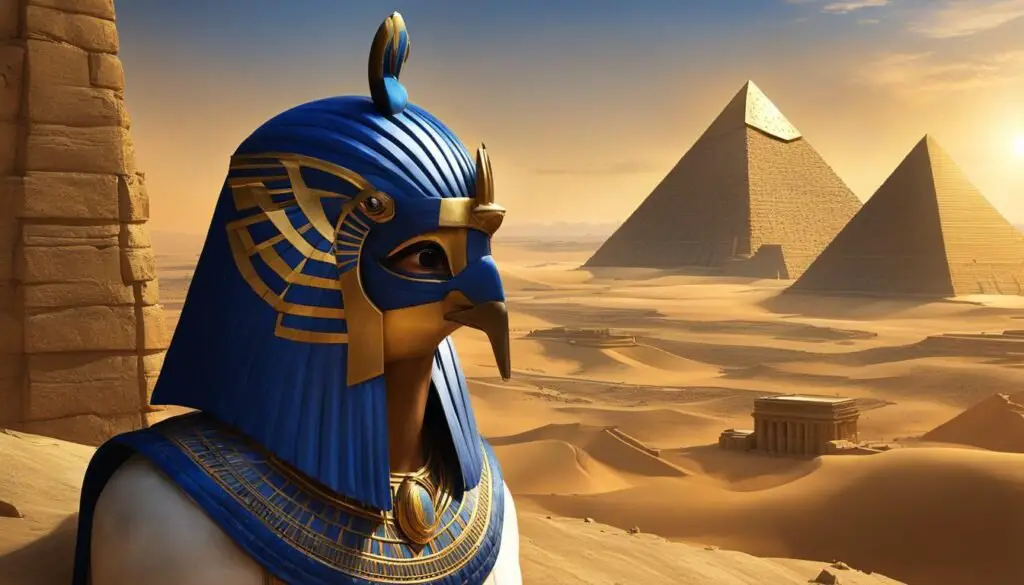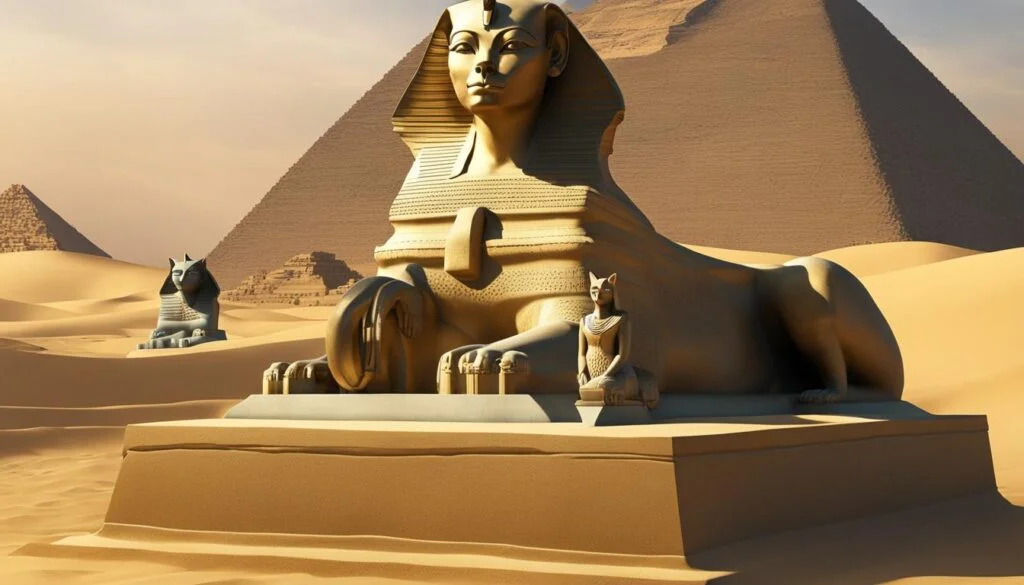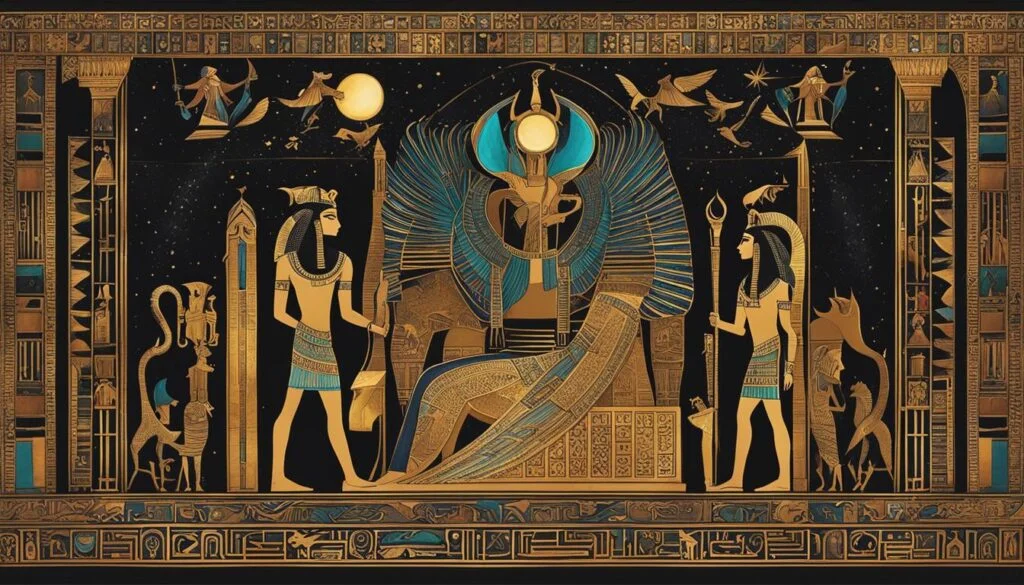Horus, the falcon god, holds a significant place in Egyptian mythology as one of the most important gods.
Son of Isis and Osiris, Horus is closely associated with Egyptian kingship and is often depicted as a falcon or a man with a falcon head, symbolizing his connection to the sky. His role as a protector and his epic battles against Set add to the intrigue surrounding this mythological figure.
Join us as we delve deeper into the captivating world of Horus and explore his significance in Egyptian mythology.
Key Takeaways:
- Horus is a crucial deity in Egyptian mythology, known for his association with Egyptian kingship.
- He is often depicted as a falcon or a man with a falcon head.
- Horus’ role as a protector and his battles against Set highlight his significance in ancient Egyptian culture.
- His various forms, including Harpocrates and Haroeris, demonstrate his multifaceted nature.
- Horus is closely tied to the sun and is considered the god of the sun in Egyptian mythology.
Horus: The Falcon God
Horus, the falcon god, holds a significant place in ancient Egyptian mythology, being one of the earliest known Egyptian gods.
He is often depicted as a majestic falcon, symbolizing power, protection, and divine authority.
From temples to tombs, Horus’ presence is prevalent in the magnificent art and architecture of ancient Egypt.
As a symbol of power, Horus is closely associated with Egyptian kingship, representing the divine authority of the Pharaohs. His image can be found in the oldest cult statue in existence, emphasizing his importance in Egyptian spiritual beliefs and rituals.
Divine Nature and Architectural Significance
Horus’ role as a falcon god is deeply embedded in Egyptian religious architecture.
Countless depictions of this magnificent deity can be found in museums and monuments across Egypt, showcasing his connection to the heavens and his celestial power.
- Horus, as the falcon god, represents the sky and its vast expanse, linking him to the sun god Ra, who symbolizes the sun’s daily journey across the sky.
. - Depictions of Horus as a falcon, soaring above the temples and pyramids, highlight his role as a protector and guardian deity.
. - The falcon-headed god is often portrayed with his wings outstretched, symbolizing his watchful gaze and his ability to safeguard the kingdom of Egypt and its inhabitants.
. - Horus’ imagery in Egyptian architectural designs signifies the harmonious integration of religion, mythology, and culture in ancient Egypt.
From the majestic falcon to the falcon-headed deity, Horus’s presence in Egyptian art and architecture reflects the profound significance of his role as a celestial protector and a symbol of divine authority.
The Contendings of Horus and Seth
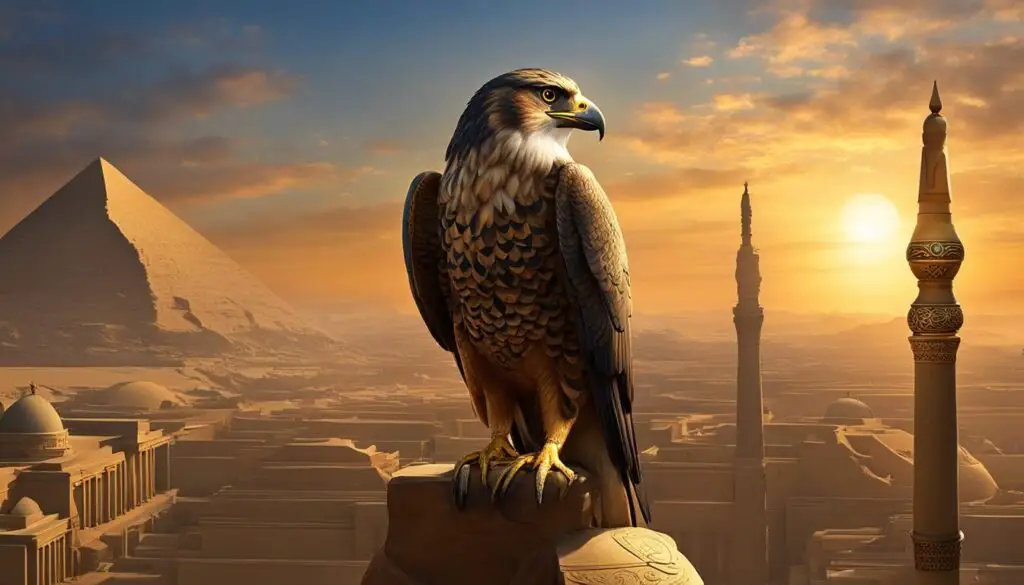
One of the most famous myths involving Horus is the “Contendings of Horus and Seth.”
This myth showcases Horus’ bravery and determination and is a significant part of Horus mythology and Horus Egyptian beliefs.
After the death of his father Osiris, Horus and Seth competed for the right to inherit the kingship of Egypt.
The myth tells of their various challenges and competitions, ultimately leading to Horus being proclaimed as the winner and the rightful heir to the throne.
This myth not only highlights the epic battles between Horus and Seth but also delves into the intricate beliefs and values held by the ancient Egyptians.
It demonstrates the importance of divine succession, the struggle between good and evil, and the ultimate triumph of justice.
Throughout the myth, Horus remains steadfast in his quest and displays unwavering loyalty to his father, Osiris.
His determination to protect his father’s legacy and secure his rightful position as the ruler of Egypt showcases the deep-rooted Egyptian beliefs in honor, justice, and the rightful order of the world.
This captivating image depicts the essence of Horus mythology, capturing the intrigue and intensity of the “Contendings of Horus and Seth.” It serves as a visual representation of the ancient Egyptian beliefs surrounding Horus and the challenges he faced in his quest for kingship.
In the next section, we will explore the different forms and guises of Horus, shedding light on the multifaceted nature of this mythological figure and his significance in Egyptian culture.
The Different Faces of Horus
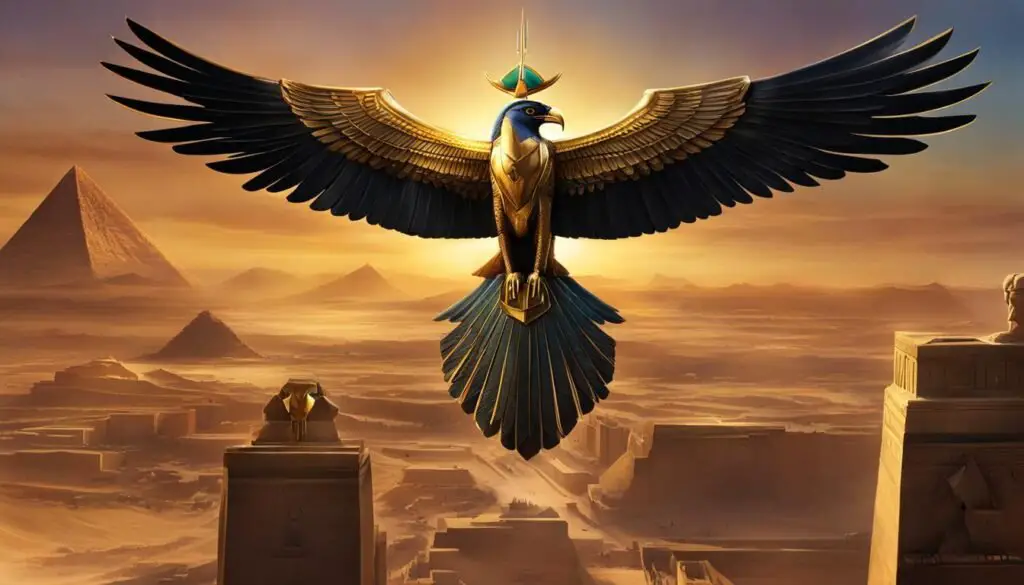
Horus, the prominent figure in Egyptian mythology, takes on various forms and names that highlight his multifaceted nature and significance across different aspects of Egyptian culture.
Let’s explore some of the different faces of Horus:
1. Harpocrates: Horus is often depicted as a child, referred to as Harpocrates. This youthful form of Horus represents innocence and purity, and he is adored as a symbol of fertility and protection.
2. Haroeris: In his old man form, known as Haroeris, Horus represents wisdom, experience, and longevity. This rendition of Horus embodies the qualities associated with aging and the passage of time.
3. Harakhte: Another version of Horus is Harakhte, which closely relates him to the sun god Ra. Harakhte symbolizes the connection between Horus and the sun, highlighting his divine association with solar power and light.
These different faces of Horus, from the child-like Harpocrates to the wise Haroeris and the sun-associated Harakhte, demonstrate the complexity and importance of Horus within Egyptian mythology and its various cultural aspects.
The Forms of Horus:
- Harpocrates: Child form, symbolizing purity and protection
- Haroeris: Old man form, representing wisdom and experience
- Harakhte: Sun-associated form, linked to the sun god Ra
Horus: The Sun God
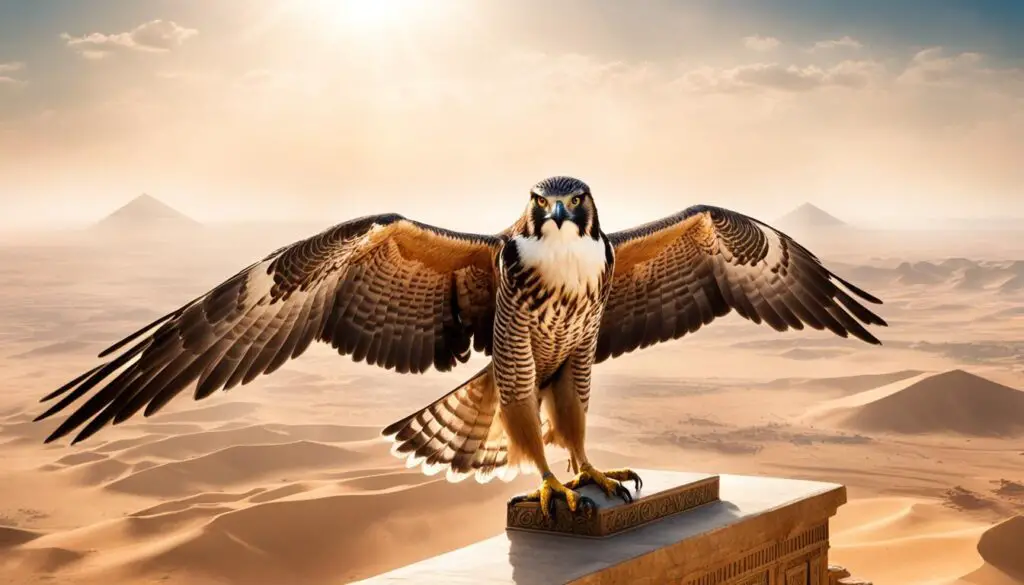
Horus, the powerful deity of Egyptian mythology, is closely associated with the sun. Considered the god of the sun, Horus is intricately connected to the daily journey of the sun across the sky in ancient Egypt.
It is believed that Horus’ eyes symbolize the sun and the moon, with one eye representing brightness and the other representing darkness.
The story of Horus’ injured eye during a battle with Seth provides an explanation for the varying brightness of the sun and the moon.
This myth adds to the rich tapestry of Egyptian beliefs surrounding the cycles of day and night, light and dark.
Throughout Egyptian history, Horus’ association with the sun was highly revered and celebrated.
His depiction as a falcon-headed god further signifies his connection to the heavens and the celestial bodies that govern the world.
As the sun rises each day, it illuminates the world and brings warmth and life, just as Horus’ presence represents power, protection, and divinity in ancient Egyptian culture.
The worship of Horus as the sun god played a significant role in the religious practices and rituals of the Egyptians, emphasizing the importance of the sun’s life-giving energy.
Lord of the Two Lands
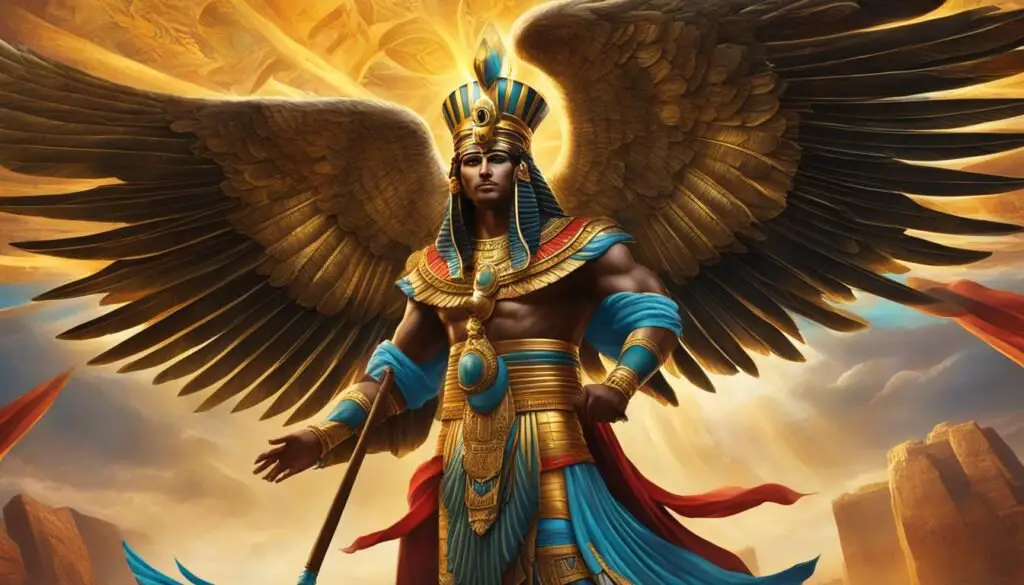
Horus is known as the “Lord of the Two Lands,” symbolizing his role as a unifying force in ancient Egypt.
As the son of Isis and Osiris, Horus was believed to be the rightful ruler of both Upper and Lower Egypt.
This concept of Horus as the embodiment of kingship played a crucial role in Egyptian culture and greatly influenced the pharaohs who claimed to be his successors.
Horus’ significance as the “Lord of the Two Lands” cannot be overstated. He represented the unity of Egypt, bringing together the two regions under his divine authority.
This divine unification was seen as essential for the stability and prosperity of the kingdom.
Furthermore, Horus’ association with the kingship extended beyond symbolism.
Pharaohs often declared themselves as the earthly incarnation of Horus, strengthening their claims to power. This divine connection between Horus and the pharaohs solidified their authority and justified their rule over Egypt.
To this day, Horus remains a prominent figure in Egyptian religion and mythology. His role as the “Lord of the Two Lands” serves as a reminder of the importance of unity and leadership in society. The legacy of Horus as a powerful and unifying deity continues to captivate and inspire people around the world.
Key Points:
- Horus is known as the “Lord of the Two Lands” in Egyptian mythology.
- He represents the unification of Upper and Lower Egypt.
- Horus’ association with kingship greatly influenced the pharaohs.
- Pharaohs often claimed to be the earthly embodiment of Horus.
- Horus’ role as the “Lord of the Two Lands” emphasizes the importance of unity and leadership.
Horus as a Protector
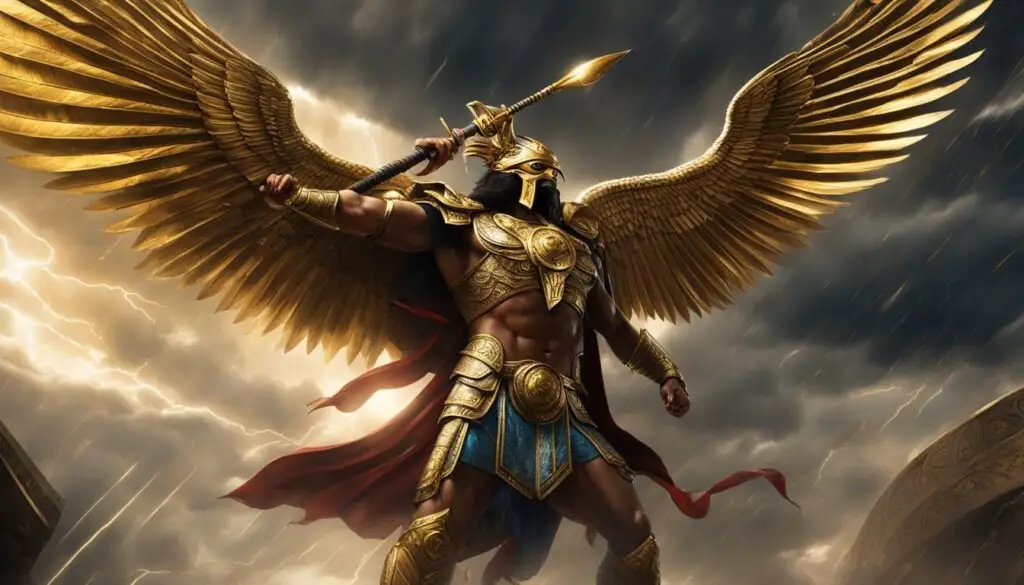
Horus, the prominent figure in Egyptian mythology, is not only known for his role as a falcon-headed god and the embodiment of Egyptian kingship but also as a powerful protector.
In one of the popular myths, his mother Isis sheltered him from Seth’s malevolent intentions, ensuring his safety. As he grew up, Horus sought vengeance for his father’s death and dedicated himself to safeguarding the kingdom of Egypt from malicious forces.
“Horus as a protector stands as a symbol of hope, defending the realm with unwavering dedication.”
Throughout ancient Egypt, Horus was revered and worshipped for his custodial responsibilities.
He was believed to offer divine protection to those who sought his aid, granting them safety, fertility, and healing.
Egyptians saw him as a savior and a guardian deity, turning to him for solace and safeguarding during challenging times.
Moreover, Horus’ association with protection extended beyond physical safety. Egyptians believed that his divine protection could shield individuals from spiritual and metaphysical threats as well, granting them spiritual well-being and serenity in their lives.
In ancient Egyptian art and iconography, Horus is often depicted with his widespread wings, symbolizing his role as a protective force. His image can be found in various temples, tombs, and artifacts, showcasing his esteemed status in Egyptian culture.
“Horus, the protector, continues to inspire reverence and awe as ancient Egyptian art immortalizes his divine presence.”
The image above captures the essence of Horus as a protector, radiating with his power and grandeur.
Horus, the mighty falcon god, with his unwavering dedication to safeguarding the kingdom of Egypt, leaves a profound mark in Egyptian mythology, positioning himself as not only a symbol of protection but also as a revered deity representing hope and salvation.
What Does the Eye of Horus Symbolize?
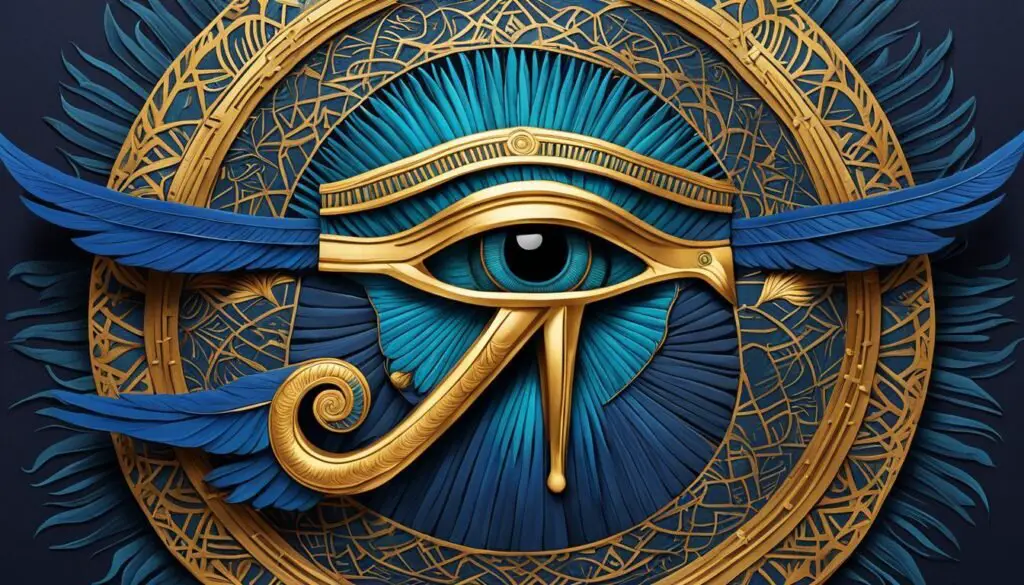
The Eye of Horus holds immense significance within ancient Egyptian culture. It serves as a powerful symbol, representing both protection and royal power.
This symbol is closely associated with the deity Horus, adding an extra layer of importance to its meaning.
The Eye of Horus is believed to possess the ability to heal and safeguard against evil forces.
In Egyptian belief, it acts as a shield, shielding individuals from harm and offering a sense of security.
The Eye of Horus represents clarity and insight, symbolizing the all-seeing nature of Horus, the Egyptian deity.
Throughout ancient Egyptian history, the Eye of Horus was commonly used as an amulet for protection.
It can be found in various artifacts, depicting its widespread use among the ancient Egyptians.
The Eye of Horus embodies the spiritual connection between individuals and the divine, providing a visual reminder of Horus’ watchful presence.
A powerful and universally recognized symbol, the Eye of Horus continues to captivate and intrigue people today.
Its significance goes beyond its aesthetic appeal, offering a glimpse into the beliefs and spirituality of ancient Egypt.
Whether admired as a piece of history or embraced as a symbol of protection, the Eye of Horus remains an enduring emblem of ancient Egyptian culture.
Horus and the Pharaoh
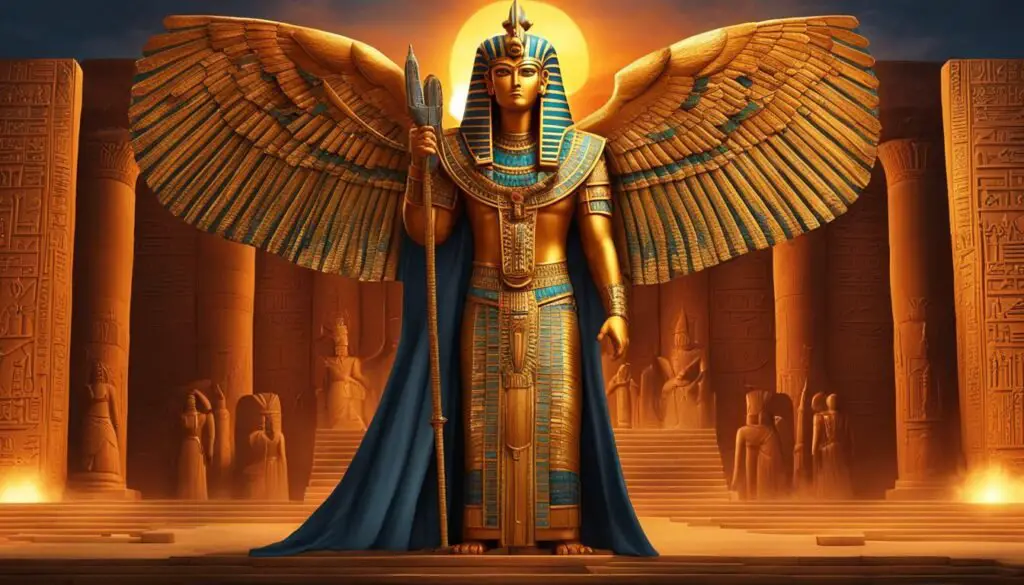
Horus, the mythological figure in Egyptian mythology, is closely intertwined with the institution of the Pharaoh in ancient Egypt.
The Pharaoh was believed to be the earthly manifestation of Horus, the falcon-headed god.
It was believed that the Pharaoh inherited Horus’ power and legitimacy, solidifying his rule over Egypt.
This sacred connection between Horus and the Pharaoh justified the Pharaoh’s authority and divine right to rule the kingdom.
The Pharaoh’s role as Horus ensured his position as the leader and protector of Egypt, aligning him with the powerful mythological figure and reinforcing his legitimacy in the eyes of the people.
In Egyptian society, Horus’ influence extended beyond mythology and shaped the cultural and political landscape.
The association between Horus and the Pharaoh emphasized the importance of divine kingship and the role of the Pharaoh as the representative of the gods on Earth.
Through the divine connection between Horus and the Pharaoh, ancient Egyptians believed that their ruler possessed the power and wisdom of the falcon god, ensuring the prosperity and well-being of the kingdom.
Horus and the Pharaoh
- The Pharaoh was seen as the earthly manifestation of Horus
- Horus’ power and legitimacy were believed to be inherited by the Pharaoh
- The connection between Horus and the Pharaoh reinforced the Pharaoh’s authority and divine right to rule
- The Pharaoh’s role as Horus emphasized the importance of divine kingship
- Ancient Egyptians believed that the Pharaoh possessed the power and wisdom of the falcon god
Horus in Egyptian Art and Architecture
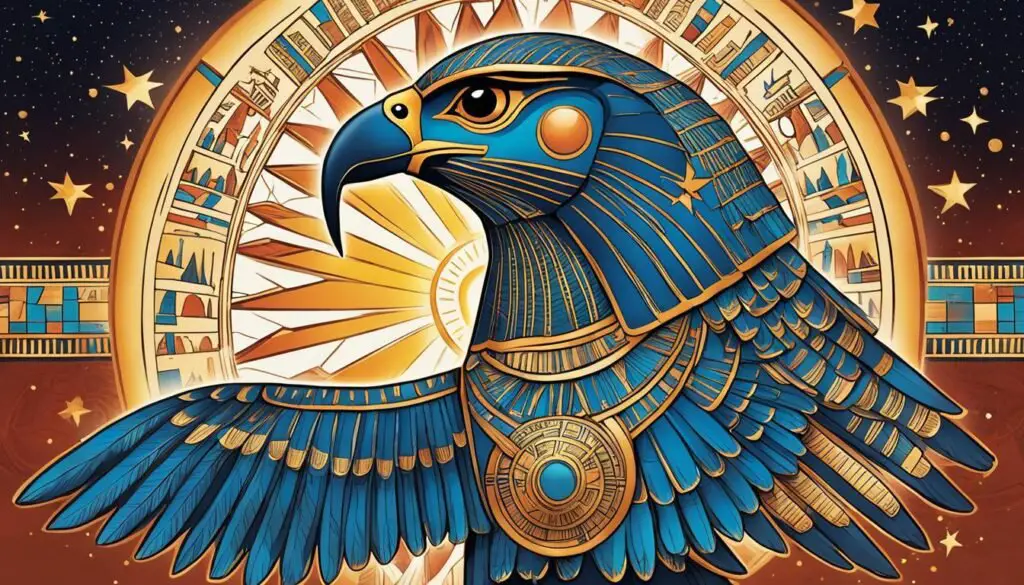
Horus, the revered falcon god, holds a significant place in Egyptian art and architecture, leaving an indelible mark on the ancient civilization.
The temples, tombs, and sacred sites throughout Egypt proudly display the image of Horus, representing his esteemed position in Egyptian religion and society.
In many artistic representations, Horus takes the form of a magnificent falcon, symbolizing his power and majesty.
These statues can be found in various locations, capturing the attention and awe of visitors who are drawn to their beauty and symbolism.
The falcon-headed Horus stands tall as a testament to the divine connection between the gods and humanity.
Horus, being a deity with multiple forms and guises, is also depicted in other ways in Egyptian art.
Whether portrayed as a child under the name Harpocrates or an old man known as Haroeris, Horus showcases different facets of his character that resonate with the Egyptian people.
Furthermore, the symbol of Horus, the Eye of Horus, is prevalent in Egyptian art and jewelry.
This iconic symbol represents protection and royal power, resonating deeply with the religious beliefs of the ancient Egyptians.
The Eye of Horus holds a fascination and mystique that continues to captivate art enthusiasts and historians alike.
In summary, Horus’ influence on Egyptian art and architecture is profound. His imagery, whether as a falcon or in various other forms, is prominently featured in sacred sites across Egypt.
The presence of Horus in Egyptian art reflects his significance in Egyptian religion and society, while the enduring symbol of the Eye of Horus serves as a reminder of the god’s power and protection.
Conclusion
Horus, the Egyptian god, is a captivating mythological figure representing power, protection, and kingship in ancient Egyptian beliefs.
With his multiple forms and associations, such as the falcon-headed god and the all-seeing eye, Horus continues to inspire and fascinate people today.
Through his myths and symbols, Horus provides valuable insights into the beliefs and culture of ancient Egypt.
As a central figure in Egyptian mythology, Horus exemplifies the enduring legacy and significance of this captivating deity.
Whether depicted as a fierce falcon or a wise protector, Horus’s presence in Egyptian art, architecture, and religion is undeniable.
His influence can be seen in temples, tombs, and sacred sites throughout the country, leaving a lasting impression on the ancient Egyptian civilization.
From his role as the son of Isis and Osiris to his connections with the pharaohs, Horus symbolizes the unification of Upper and Lower Egypt and the divine right of the ruler.
As a result, Horus not only played a crucial role in maintaining unity but also served as a source of guidance and protection for those who worshiped him.
Frequently Asked Questions
Q: What is Horus the god of?
A: Horus is an ancient Egyptian god, often depicted as a falcon. He is known as the god of the sky, war, and hunting. Horus is also associated with kingship and was believed to protect the pharaoh.
Q: What does the Horus symbolize?
A: Horus symbolizes power, protection, and vigilance. His image, particularly the Eye of Horus, is associated with healing, sacrifice, and protection. The falcon represents keen vision and rulership.
Q: Is Jesus and Horus the same person?
A: No, Jesus and Horus are not the same person. Jesus is a central figure in Christianity with historical and religious significance. Horus, on the other hand, is a deity from ancient Egyptian mythology. The two are separate entities from different cultural and religious backgrounds.
Q: Who was Horus to Isis?
A: Horus is the son of Isis, an important goddess in Egyptian mythology. Isis is depicted as a devoted mother who protected and nurtured Horus after the death of his father, Osiris.
Q: Is Horus good or bad?
A: In Egyptian mythology, Horus is generally seen as a positive figure, embodying order, justice, and rightful rulership. He is often contrasted with Seth, the god of chaos and disorder.
Q: What are three facts about Horus?
A: 1. Horus is often depicted as a falcon or a man with a falcon’s head. 2. He is one of the oldest and most significant deities in ancient Egyptian religion. 3. Horus is closely associated with the pharaoh, who was believed to be his earthly embodiment.
Q: Is Horus mentioned in the Bible?
A: No, Horus is not mentioned in the Bible. He is a deity from ancient Egyptian mythology and not part of the religious texts or narratives of Christianity or Judaism.
Q: What religion is Horus in?
A: Horus is a deity in ancient Egyptian religion. This polytheistic belief system was central to the culture and society of ancient Egypt.
Q: What is Horus’s weakness?
A: In mythology, Horus’s main weakness is depicted in his vulnerability during his youth, especially after the death of his father Osiris and during his battles with Seth. He often relied on the protection and wisdom of his mother, Isis.
Q: What power does Horus have?
A: Horus, as a god of the sky, war, and hunting, was believed to possess immense powers. These include the ability to control the sky and the sun, as well as being a formidable warrior. The “Eye of Horus” is also a symbol of protection and healing power.


